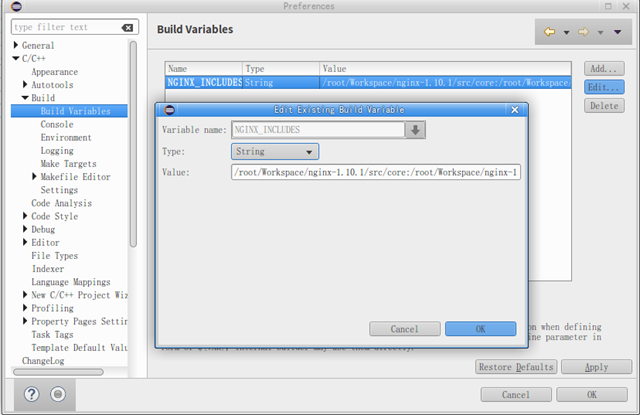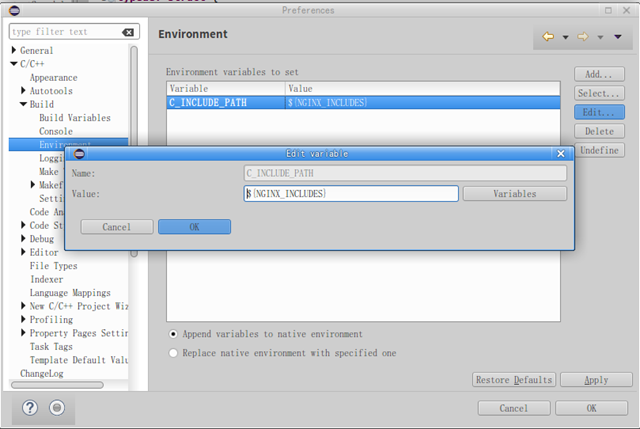开发Nginx模块
开发Nginx模块
前面的哪些话
关于Nginx模块开发的博客资料,网上很多,很多。但是,每篇博客都只提要点,无法"step by step"照着做,对于初次接触Nginx开发的同学,只能像只盲目的蚂蚁瞎燥急!该篇文章没有太多技术深度,只是一步一步说明白Nginx模块的开发过程。
开发环境搭建
工欲善其事,必先利其器。个人推荐Eclipse CDT 作为IDE,原因很简单,代码提示与补全功能很全,完胜Codeblock这类...相信与否,试过就知道。
在ubuntu下搭建开发环境:
安装GCC编译器
apt-get install build-essential安装pcre/openssl/zlib开发库
apt-get install libpcre3-dev
apt-get install libssl-dev
apt-get install libzip-dev必需安装nginx核心模块依赖的pcre,openssl,zilib开发库
安装JRE/Eclipse CDT
apt-get install openjdk-8-jre
wget http://ftp.yz.yamagata-u.ac.jp/pub/eclipse//technology/epp/downloads/release/neon/R/eclipse-cpp-neon-R-linux-gtk-x86_64.tar.gz && tzr -xzvf eclipse-cpp-neon-R-linux-gtk-x86_64.tar.gz下载nginx源码
wget http://nginx.org/download/nginx-1.10.1.tar.gz && tar -xzvf nginx-1.10.1.tar.gz配置CDT Build Environment
添加变量,值Nginx src下各模块路径,用冒号分隔,例如:/root/Workspace/nginx-1.10.1/src/core:/root/Workspace/nginx-1.10.1/src/event:/root/Workspace/nginx-1.10.1/src/http:/root/Workspace/nginx-1.10.1/src/mail:/root/Workspace/nginx-1.10.1/src/stream:/root/Workspace/nginx-1.10.1/src/os/unix添加环境变量,创建C项目时自动作为-I选项


Nginx模块编译流程
Nginx使用configure脚本分析环境,自动生成objs结果。哪么configure如何编译第三方模块?答案是--add-module指定第三方模块目录,并将目录存为$ngx_addon_dir环境变量。执行$ngx_addon_dir/config脚本,读取模块配置。在config中的环境变量分为2种:小写的本地环境变量,大写的全局环境变量。例如:
ngx_addon_name=ngx_http_mytest_module
HTTP_MODULES="$HTTP_MODULES ngx_http_mytest_module"
NGX_ADDON_SRCS="$NGX_ADDON_SRCS $ngx_addon_dir/ngx_http_mytest_moudle.c"
CORE_LIBS="$CORE_LIBS -lpcre"- HTTP_MODULES中的ngx_http_mytest_module就是NGX_ADDON_SRCS中源码(如果有多个,都要写上)ngx_http_mytest_module.c中定义的ngx_module_t类型的全局变量。
- 可见,第三方模块的入口点就是ngx_module_t类型全局变量,该变量又关联ngx_http_module_t类型static变量,与ngx_command_t类型static数组。
- 在ngx_http_module_t中定义上下文配置nginx.conf解析的回调方法。
- 在ngx_command_t中定义配置项处理的set回调方法。
- Nginx的全部操作都是异步的。在上述的方法中根据需要又会使用其他handler方法。
以上可以看成Nginx第三方模块的起式。
Upstream例子源码
config
ngx_addon_name=ngx_http_mytest_module
HTTP_MODULES="$HTTP_MODULES ngx_http_mytest_module"
NGX_ADDON_SRCS="$NGX_ADDON_SRCS $ngx_addon_dir/ngx_http_mytest_module.c"源代码
#include <ngx_config.h>
#include <ngx_core.h>
#include <ngx_http.h>
#include <ngx_stream.h>
typedef struct {
ngx_http_upstream_conf_t upstream;
} mytest_conf_t;
typedef struct {
ngx_http_status_t status;
ngx_str_t backendServer;
} mytest_ctx_t;
static void *mytest_create_loc_conf(ngx_conf_t *cf);
static char *mytest_merge_loc_conf(ngx_conf_t *cf, void *parent, void *child);
static ngx_int_t mytest_upstream_create_request(ngx_http_request_t *r);
static ngx_int_t mytest_upstream_process_status_line(ngx_http_request_t *r);
static ngx_int_t mytest_upstream_process_header(ngx_http_request_t *r);
static void mytest_upstream_finalize_request(ngx_http_request_t *r,
ngx_int_t rc);
static ngx_int_t mytest_handler(ngx_http_request_t *r);
static char *mytest(ngx_conf_t *cf, ngx_command_t *cmd, void *conf);
static ngx_http_module_t mytest_ctx = {
NULL,
NULL,
NULL,
NULL,
NULL,
NULL,
mytest_create_loc_conf,
mytest_merge_loc_conf
};
static ngx_command_t mytest_commands[] = {
{
ngx_string("mytest"),
NGX_HTTP_MAIN_CONF | NGX_HTTP_SRV_CONF | NGX_HTTP_LOC_CONF | NGX_HTTP_LMT_CONF | NGX_CONF_NOARGS,
mytest,
NGX_HTTP_LOC_CONF_OFFSET,
0,
NULL
},
ngx_null_command
};
ngx_module_t ngx_http_mytest_module = {
NGX_MODULE_V1,
&mytest_ctx,
mytest_commands,
NGX_HTTP_MODULE,
NULL,
NULL,
NULL,
NULL,
NULL,
NULL,
NULL,
NGX_MODULE_V1_PADDING
};
static ngx_str_t mytest_upstream_hide_headers[] =
{
ngx_string("Date"),
ngx_string("Server"),
ngx_string("X-Pad"),
ngx_string("X-Accel-Expires"),
ngx_string("X-Accel-Redirect"),
ngx_string("X-Accel-Limit-Rate"),
ngx_string("X-Accel-Buffering"),
ngx_string("X-Accel-Charset"),
ngx_null_string
};
static void *mytest_create_loc_conf(ngx_conf_t *cf){
mytest_conf_t *mycf;
mycf = (mytest_conf_t *)ngx_pcalloc(cf->pool, sizeof(mytest_conf_t));
if(mycf == NULL){
return NULL;
}
mycf->upstream.connect_timeout = 60000;
mycf->upstream.send_timeout = 60000;
mycf->upstream.read_timeout = 60000;
mycf->upstream.store_access = 0600;
mycf->upstream.buffering = 0;
mycf->upstream.bufs.num = 8;
mycf->upstream.bufs.size = ngx_pagesize;
mycf->upstream.buffer_size = ngx_pagesize;
mycf->upstream.busy_buffers_size = 2 * ngx_pagesize;
mycf->upstream.temp_file_write_size = 2 * ngx_pagesize;
mycf->upstream.max_temp_file_size = 1024 * 1024 *1024;
mycf->upstream.hide_headers = NGX_CONF_UNSET_PTR;
mycf->upstream.pass_headers = NGX_CONF_UNSET_PTR;
return mycf;
}
static char *mytest_merge_loc_conf(ngx_conf_t *cf, void *parent, void *child){
mytest_conf_t *prev = (mytest_conf_t *)parent;
mytest_conf_t *conf = (mytest_conf_t *)child;
ngx_hash_init_t hash;
hash.max_size = 100;
hash.bucket_size = 1024;
hash.name = "proxy_headers_hash";
if(ngx_http_upstream_hide_headers_hash(cf,&conf->upstream, &prev->upstream,mytest_upstream_hide_headers,&hash)!=NGX_OK){
return NGX_CONF_ERROR;
}
return NGX_CONF_OK;
}
static ngx_int_t mytest_upstream_create_request(ngx_http_request_t *r){
static ngx_str_t backendQueryLine = ngx_string("GET /search?q=%V HTTP/1.1\r\nHost: www.google.com.hk\r\nConnection: close\r\n\r\n");
ngx_int_t queryLineLen = backendQueryLine.len + r->args.len - 2;
ngx_buf_t *b = ngx_create_temp_buf(r->pool, queryLineLen);
if(b == NULL) return NGX_ERROR;
b->last = b->pos + queryLineLen;
ngx_snprintf(b->pos, queryLineLen, (char *)backendQueryLine.data, &r->args);
r->upstream->request_bufs = ngx_alloc_chain_link(r->pool);
if(r->upstream->request_bufs == NULL) return NGX_ERROR;
r->upstream->request_bufs->buf = b;
r->upstream->request_bufs->next = NULL;
r->upstream->request_sent = 0;
r->upstream->header_sent = 0;
r->header_hash = 1;
return NGX_OK;
}
static ngx_int_t mytest_upstream_process_status_line(ngx_http_request_t *r){
size_t len;
ngx_int_t rc;
ngx_http_upstream_t *u;
mytest_ctx_t *ctx = ngx_http_get_module_ctx(r, ngx_http_mytest_module);
if(ctx == NULL) return NGX_ERROR;
u = r->upstream;
rc = ngx_http_parse_status_line(r, &u->buffer, &ctx->status);
if(rc == NGX_AGAIN) return rc;
if(rc == NGX_ERROR){
ngx_log_error(NGX_LOG_ERR, r->connection->log, 0, "upstream sent to valid HTTP/1.0 header");
r->http_version = NGX_HTTP_VERSION_9;
u->state->status = NGX_HTTP_OK;
return NGX_OK;
}
if(u->state){
u->state->status = ctx->status.code;
}
u->headers_in.status_n = ctx->status.code;
len = ctx->status.end - ctx->status.start;
u->headers_in.status_line.len = len;
u->headers_in.status_line.data = ngx_pcalloc(r->pool, len);
if(u->headers_in.status_line.data == NULL) return NGX_ERROR;
ngx_memcpy(u->headers_in.status_line.data, ctx->status.start, len);
u->process_header = mytest_upstream_process_header;
return mytest_upstream_process_header(r);
}
static ngx_int_t mytest_upstream_process_header(ngx_http_request_t *r){
ngx_int_t rc;
ngx_table_elt_t *h;
ngx_http_upstream_header_t *hh;
ngx_http_upstream_main_conf_t *umcf;
umcf = ngx_http_get_module_main_conf(r, ngx_http_upstream_module);
for(;;){
rc = ngx_http_parse_header_line(r, &r->upstream->buffer, 1);
if(rc == NGX_OK){
h = ngx_list_push(&r->upstream->headers_in.headers);
if(h == NULL) return NGX_ERROR;
h->hash = r->header_hash;
h->key.len = r->header_name_end - r->header_name_start;
h->value.len = r->header_end - r->header_start;
h->key.data = ngx_pcalloc(r->pool, h->key.len + 1 + h->value.len + 1 + h->key.len);
if(h->key.data == NULL) return NGX_ERROR;
h->value.data = h->key.data + h->key.len + 1;
h->lowcase_key = h->key.data + h->key.len + 1 + h->value.len + 1;
ngx_memcpy(h->key.data, r->header_name_start, h->key.len);
h->key.data[h->key.len]='\0';
ngx_memcpy(h->value.data, r->header_start, h->value.len);
h->value.data[h->value.len] = '\0';
if(h->key.len == r->lowcase_index){
ngx_memcpy(h->lowcase_key, r->lowcase_header, h->key.len);
}else{
ngx_strlow(h->lowcase_key, h->key.data, h->key.len);
}
hh = ngx_hash_find(&umcf->headers_in_hash, h->hash, h->lowcase_key, h->key.len);
if(hh && hh->handler(r, h, hh->offset)!=NGX_OK) return NGX_ERROR;
continue;
}
if(rc == NGX_HTTP_PARSE_HEADER_DONE){
if(r->upstream->headers_in.server == NULL){
h = ngx_list_push(&r->upstream->headers_in.headers);
if(h == NULL) return NGX_ERROR;
h->hash = ngx_hash(ngx_hash(ngx_hash(ngx_hash(ngx_hash('s', 'e'), 'r'), 'v'), 'e'), 'r');
ngx_str_set(&h->key, "Server");
ngx_str_null(&h->value);
h->lowcase_key = (u_char *)"server";
}
if(r->upstream->headers_in.date == NULL){
h = ngx_list_push(&r->upstream->headers_in.headers);
if(h == NULL) return NGX_ERROR;
h->hash = ngx_hash(ngx_hash(ngx_hash('d', 'a'), 't'), 'e');
ngx_str_set(&h->key, "Date");
ngx_str_null(&h->value);
h->lowcase_key = (u_char *)"date";
}
return NGX_OK;
}
if(rc == NGX_AGAIN) return NGX_AGAIN;
ngx_log_error(NGX_LOG_ERR, r->connection->log, 0, "upstream sent invalid header");
return NGX_HTTP_UPSTREAM_FT_INVALID_HEADER;
}
}
static void mytest_upstream_finalize_request(ngx_http_request_t *r, ngx_int_t rc){
ngx_log_error(NGX_LOG_DEBUG, r->connection->log, 0, "mytest_upstream_finalize_request");
}
static char *mytest(ngx_conf_t *cf, ngx_command_t *cmd, void *conf){
ngx_http_core_loc_conf_t *clcf;
clcf = ngx_http_conf_get_module_loc_conf(cf,ngx_http_core_module);
clcf->handler = mytest_handler;
return NGX_CONF_OK;
}
static ngx_int_t mytest_handler(ngx_http_request_t *r){
mytest_ctx_t *myctx = ngx_http_get_module_ctx(r, ngx_http_mytest_module);
if(myctx == NULL){
myctx = ngx_pcalloc(r->pool, sizeof(mytest_ctx_t));
if(myctx == NULL) return NGX_ERROR;
ngx_http_set_ctx(r, myctx, ngx_http_mytest_module);
}
if(ngx_http_upstream_create(r)!=NGX_OK){
ngx_log_error(NGX_LOG_ERR, r->connection->log, 0, "ngx_http_upstream_create() failed");
return NGX_ERROR;
}
mytest_conf_t *mycf = (mytest_conf_t *)ngx_http_get_module_loc_conf(r, ngx_http_mytest_module);
ngx_http_upstream_t *u = r->upstream;
u->conf = &mycf->upstream;
u->buffering = mycf->upstream.buffering;
u->resolved = (ngx_http_upstream_resolved_t *) ngx_pcalloc(r->pool, sizeof(ngx_http_upstream_resolved_t));
if(u->resolved == NULL){
ngx_log_error(NGX_LOG_ERR, r->connection->log, 0, "ngx_pcalloc resolved error. %s", strerror(errno));
return NGX_ERROR;
}
static struct sockaddr_in backendSockAddr;
struct hostent *pHost = gethostbyname((char *)"www.google.com.hk");
if(pHost == NULL){
ngx_log_error(NGX_LOG_ERR, r->connection->log, 0, "gethostbyname fail. %s", strerror(errno));
return NGX_ERROR;
}
backendSockAddr.sin_family = AF_INET;
backendSockAddr.sin_port = htons((in_port_t)80);
char *pDmsIP = inet_ntoa(*(struct in_addr *)(pHost->h_addr_list[0]));
backendSockAddr.sin_addr.s_addr = inet_addr(pDmsIP);
myctx->backendServer.data = (u_char *)pDmsIP;
myctx->backendServer.len = strlen(pDmsIP);
u->resolved->sockaddr = (struct sockaddr *)&backendSockAddr;
u->resolved->port = htons((in_port_t)80);
u->resolved->socklen = sizeof(struct sockaddr_in);
u->resolved->naddrs = 1;
u->create_request = mytest_upstream_create_request;
u->process_header = mytest_upstream_process_status_line;
u->finalize_request = mytest_upstream_finalize_request;
r->main->count++;
ngx_http_upstream_init(r);
return NGX_DONE;
}注意:《Nginx深入解析》的demo少了这句:“u->resolved->port = htons((in_port_t)80);”,否则报错“2016/09/09 11:24:18 [error] 28352#0: *1 no port in upstream "", client: 127.0.0.1, server: localhost, request: "GET /mytest?q=test HTTP/1.1", host: "localhost"”
编译脚本
./configure --prefix=/usr/local/nginx --add-module=/root/Workspace/nginx-modules/ngx_http_mytest_module --with-debug
sudo make
sudo make install安装后即可到/usr/local/nginx下配置nginx.conf进行测试。
Subrequest例子源码
config
ngx_addon_name=ngx_http_mytest_module
HTTP_MODULES="$HTTP_MODULES ngx_http_mytest_module"
NGX_ADDON_SRCS="$NGX_ADDON_SRCS $ngx_addon_dir/ngx_http_mytest_module.c"源代码
#include <ngx_config.h>
#include <ngx_core.h>
#include <ngx_http.h>
typedef struct {
ngx_str_t stock[6];
} mytest_ctx_t;
static ngx_int_t mytest_subrequest_post_handler(ngx_http_request_t *r, void *data, ngx_int_t rc);
static void mytest_post_handler(ngx_http_request_t *r);
static ngx_int_t mytest_handler(ngx_http_request_t *r);
static char *mytest(ngx_conf_t *cf, ngx_command_t *cmd, void *conf);
static ngx_http_module_t mytest_conf = {
NULL,
NULL,
NULL,
NULL,
NULL,
NULL,
NULL,
NULL
};
static ngx_command_t mytest_commands[] = {
{
ngx_string("mytest"),
NGX_HTTP_MAIN_CONF | NGX_HTTP_SRV_CONF | NGX_HTTP_LOC_CONF | NGX_CONF_NOARGS,
mytest,
NGX_HTTP_LOC_CONF_OFFSET,
0,
NULL
},
ngx_null_command
};
ngx_module_t ngx_http_mytest_module = {
NGX_MODULE_V1,
&mytest_conf,
mytest_commands,
NGX_HTTP_MODULE,
NULL,
NULL,
NULL,
NULL,
NULL,
NULL,
NULL,
NGX_MODULE_V1_PADDING
};
static ngx_int_t mytest_subrequest_post_handler(ngx_http_request_t *r,
void *data, ngx_int_t rc) {
ngx_http_request_t *pr = r->parent;
mytest_ctx_t *myctx = ngx_http_get_module_ctx(pr, ngx_http_mytest_module);
pr->headers_out.status = r->headers_out.status;
if (r->headers_out.status == NGX_HTTP_OK) {
int flag = 0;
ngx_buf_t *pRecvBuf = &r->upstream->buffer;
for (; pRecvBuf->pos != pRecvBuf->last; pRecvBuf->pos++) {
if (*pRecvBuf->pos == ',' || *pRecvBuf->pos == '\"') {
if (flag > 0) {
myctx->stock[flag - 1].len = pRecvBuf->pos
- myctx->stock[flag - 1].data;
}
flag++;
myctx->stock[flag - 1].data = pRecvBuf->pos + 1;
}
if (flag > 6)
break;
}
}
pr->write_event_handler = mytest_post_handler;
return NGX_OK;
}
static void mytest_post_handler(ngx_http_request_t *r){
if(r->headers_out.status != NGX_HTTP_OK){
ngx_http_finalize_request(r,r->headers_out.status);
return;
}
mytest_ctx_t *myctx = ngx_http_get_module_ctx(r,ngx_http_mytest_module);
ngx_str_t output_format = ngx_string("stock[%V],Today current price:%V, volumn:%V");
int bodylen = output_format.len + myctx->stock[0].len + myctx->stock[1].len + myctx->stock[4].len - 6;
r->headers_out.content_length_n = bodylen;
ngx_buf_t *b = ngx_create_temp_buf(r->pool, bodylen);
ngx_snprintf(b->pos,bodylen,(char *)output_format.data, &myctx->stock[0], &myctx->stock[1], &myctx->stock[4]);
b->last = b->pos + bodylen;
b->last_buf = 1;
ngx_chain_t out;
out.buf = b;
out.next = NULL;
static ngx_str_t type = ngx_string("text/plain; charset=GBK");
r->headers_out.content_type = type;
r->headers_out.status = NGX_HTTP_OK;
r->connection->buffered |= NGX_HTTP_WRITE_BUFFERED;
ngx_int_t ret = ngx_http_send_header(r);
ret = ngx_http_output_filter(r, &out);
ngx_http_finalize_request(r,ret);
}
static ngx_int_t mytest_handler(ngx_http_request_t *r){
mytest_ctx_t *myctx = ngx_http_get_module_ctx(r, ngx_http_mytest_module);
if(myctx == NULL){
myctx = ngx_pcalloc(r->pool, sizeof(mytest_ctx_t));
if(myctx == NULL) return NGX_ERROR;
ngx_http_set_ctx(r,myctx,ngx_http_mytest_module);
}
ngx_http_post_subrequest_t *psr = ngx_pcalloc(r->pool, sizeof(ngx_http_post_subrequest_t));
if(psr == NULL) return NGX_HTTP_INTERNAL_SERVER_ERROR;
psr->handler = mytest_subrequest_post_handler;
psr->data = myctx;
ngx_str_t sub_prefix = ngx_string("/list=");
ngx_str_t sub_location;
sub_location.len = sub_prefix.len + r->args.len;
sub_location.data = ngx_pcalloc(r->pool, sub_location.len);
ngx_snprintf(sub_location.data, sub_location.len, "%V%V", &sub_prefix, &r->args);
ngx_http_request_t *sr;
ngx_int_t rc = ngx_http_subrequest(r, &sub_location, NULL, &sr, psr, NGX_HTTP_SUBREQUEST_IN_MEMORY);
if(rc != NGX_OK) return NGX_ERROR;
return NGX_DONE;
}
static char *mytest(ngx_conf_t *cf, ngx_command_t *cmd, void *conf){
ngx_http_core_loc_conf_t *clcf = ngx_http_conf_get_module_loc_conf(cf, ngx_http_core_module);
clcf->handler = mytest_handler;
return NGX_CONF_OK;
}
编译脚本
./configure --prefix=/usr/local/nginx --add-module=/root/Workspace/nginx-modules/ngx_http_mytest_module2 --with-debug
sudo make
sudo make install
开发Nginx模块的更多相关文章
- 手把手教你开发Nginx模块
前面的哪些话 关于Nginx模块开发的博客资料,网上很多,很多.但是,每篇博客都只提要点,无法"step by step"照着做,对于初次接触Nginx开发的同学,只能像只盲目的蚂 ...
- 开发Nginx模块Helloworld
本文是对<深入理解Nginx>一书中的实例进行实战时的记录. 1模块目录结构 my_test_module/ ├── config └── ngx_http_mytest_module.c ...
- 【转】Nginx模块开发入门
转自: http://kb.cnblogs.com/page/98352/ 结论:对Nginx模块开发入门做了一个helloworld的示例,简单易懂.也有一定的深度.值得一看. Nginx模块开发入 ...
- Nginx模块开发入门
前言 Nginx是当前最流行的HTTP Server之一,根据W3Techs的统计,目前世界排名(根据Alexa)前100万的网站中,Nginx的占有率为6.8%.与Apache相比,Nginx在高并 ...
- [转] Nginx模块开发入门
前言 Nginx是当前最流行的HTTP Server之一,根据W3Techs的统计,目前世界排名(根据Alexa)前100万的网站中,Nginx的占有率为6.8%.与Apache相比,Nginx在高并 ...
- Nginx模块开发入门(转)
前言 Nginx是当前最流行的HTTP Server之一,根据W3Techs的统计,目前世界排名(根据Alexa)前100万的网站中,Nginx的占有率为6.8%.与Apache相比,Nginx在高并 ...
- Nginx模块开发入门(转)
前言 Nginx是当前最流行的HTTP Server之一,根据W3Techs的统计,目前世界排名(根据Alexa)前100万的网站中,Nginx的占有率为6.8%.与Apache相比,Nginx在高并 ...
- FW: Nginx模块开发入门
前言 Nginx是当前最流行的HTTP Server之一,根据W3Techs的统计,目前世界排名(根据Alexa)前100万的网站中,Nginx的占有率为6.8%.与Apache相比,Nginx在高并 ...
- linux下nginx模块开发入门
本文模块编写参考http://blog.codinglabs.org/articles/intro-of-nginx-module-development.html 之前讲了nginx的安装,算是对n ...
随机推荐
- 用js判断一个复选框是否被选中
<html> <head> <title> 复选框全选.全不选.反选.必选一个 </title> ...
- 如何优化cocos2d程序的内存使用和程序大小:第二部分_(转)
减少你的程序的大小 把纹理的颜色位深度减少到16位,不仅可以减少内存压力,还可以有效地减少程序的体积.但是,我们还有其它方法可以更进一步地减少程序的大小. TexturePacker PNG 图片优化 ...
- 在hibernate中使用SQL语句
- TOJ3744(Transportation Costs)
Transportation Costs Time Limit(Common/Java):2000MS/6000MS Memory Limit:65536KByte Total Submi ...
- Guangsoushensou 2
<span style="color:#330099;">/* C - 广搜 基础 Time Limit:1000MS Memory Limit:65536KB 64b ...
- Compiling JSPs Using the Command-Line Compiler---官方
Web Server provides the following ways of compiling JSP 2.1-compliant source files into servlets: JS ...
- camera理论基础和工作原理
写在前面的话,本文是因为工作中需要编写摄像头程序,因为之前没有做过这类产品,所以网上搜索的资料,先整理如下,主要参考文章如下,如果有侵权,请联系我:另外,转载请注明出处.本文不一定全部正确,如果发现错 ...
- windows 与Linux 互传文件
下载putty,将putty的安装路径添加到Windows的环境变量中: 我的电脑->属性->高级->环境变量->系统变量,双击其中的Path,在分号后添加putty的 ...
- Java基础知识强化之集合框架笔记45:Set集合之TreeSet存储自定义对象并遍历练习1(自然排序:Comparable)
1. 自然排序: TreeSet会调用集合元素的compareTo(Object obj)方法来比较元素之间的大小关系,然后将集合元素按照升序排列,这种方式就是自然排序. Java中提供了一个Comp ...
- OSI七层模型理解
物理层功能1,为数据端设备提供传送数据的通路 功能2,传输数据 接口.传输介质.信号的传输.网络设备 有线介质:双绞线(普通的网线),光纤. 无线介质:无线电.微波.激光.红外线. 例如手机.电视接收 ...
